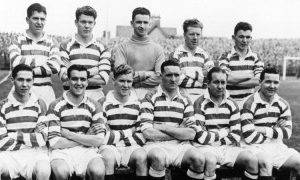
They had finished eighth in the league and gone out of the Scottish Cup in the fourth round.
Their on-pitch credentials to be one of the top eight sides in Britain in the summer of 1953 were questionable at best.
Yet, an invitation to join Rangers, Hearts, Hibernian, Arsenal, Manchester United, Newcastle United and Tottenham Hotspur in a tournament celebrating the coronation of Queen Elizabeth II landed on the Parkhead doormat.
The scene outside a pub in Coatbridge on 20 May was perhaps a clue to the organisers’ thinking.
“On the day of the Coronation Cup final, no fewer than 30 buses of Celtic fans made the trip to Hampden Park,” remembers legendary former commentator Archie Macpherson, watching on as a teenager at the time.
By then, it was clear Celtic were no longer there to make up the numbers and fill the stands of host city Glasgow.
A few hours later, more than 117,000 fans were poised, packed into Hampden, eager to see a coronation of a different kind; their team crowned the best of Britain.
If it was anyone, it should have been Rangers.
The prevailing view before the start of the tournament was that no Scottish club was better placed to take on the challenge from the best of the English game.
Rangers were the preeminent force in Scottish football, having just captured their fourth title in seven seasons and a league and cup double.
Their strength was in defence; a formidable unit nicknamed ‘the Iron Curtain’ and led by the towering George Young.
But their hopes were undone in the first round of the knockout competition. Drawn against Manchester United, they lost 2-1.
“In those days, there wasn’t the gulf between English and Scottish football that there is now,” remembers Macpherson.
“There was enough character and quality in Scottish football to feel, for Rangers supporters in particular, that they had a chance.
“But I think Rangers may have expended much of their energy in winning the league at that point.”
Instead it was left to Celtic and Hibernian to represent Scotland in the semi-finals. With an 11-year-old Govan schoolboy called Alex Ferguson watching on from the stands, Celtic followed up their win over English champions Arsenal by defeating Manchester United. Hibs thrashed Newcastle on the other side of the draw.
The climax of a tournament billed as a battle of Britain would be an all-Scottish dust-up.
“With post-season competitions, because energy has gone into winning cups and leagues, you have to be careful about making wide assessments about the quality of the leagues, but it did seem to provide ammunition to those of us who thought English football was overrated and that Scottish football did enjoy the same kind of status,” remembers Macpherson.
Hibs were favourites to prevail in the final.
Their ‘Famous Five’ forward line – Gordon Smith, Bobby Johnstone, Lawrie Reilly, Eddie Turnbull and Willie Ormond – was well established.
A well-honed mix of graft and attacking craft, they had taken their side to within a whisker of Rangers in the league, missing out on the title on goal average.
But Celtic, to delight of the majority of the crowd, took a first-half lead though Neil Mochan’s long-range effort. Hibs pushed for an equaliser, but goalkeeper Johnny Bonnar pushed back with a series of saves, before Jimmy Walsh nicked a second for Celtic late on.
Celtic’s players, with captain Jock Stein in their midst, crowded round the trophy for a team photo at a smart post-match function.
Little did they or he realise that it was a win that paved the way to a bigger prize.
Fourteen years later, Stein headed to another final with Celtic. This time it was as manager, rather than captain. This time, the prize was to be champions of a continent, rather than of a coronation celebration.
And this time, Macpherson went too.
By now 30 years old, and having switched careers from teaching to commentating, he was covering a match overseas for the first time.
“I went to Lisbon and thought they wouldn’t win,” he says of Celtic’s 1967 European Cup final against heavily fancied Inter Milan.
“But we didn’t think they would win the Coronation Cup final either.”
Once again, Celtic overturned the odds, defeating the two-time champions to become the first British team to lift the trophy.
“Lisbon was the sort of challenge that they would stand up to because of what they had done in 1953. I’m sure it went through their minds, in fact I am convinced,” concludes Macpherson.
“The Coronation Cup win gave Celtic some sort of posture if you like, that they were fit to take on any competitor.
“It gave Scottish football a big boost and it certainly was at the root of Celtic’s growth in the future.”
Source – BBC Sport


Share your thoughts